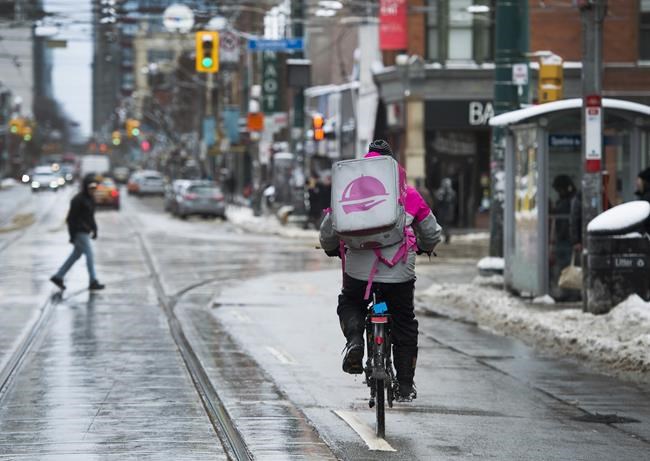Canadian Labour Congress president says parties need plan to protect gig workers
Advertisement
Read this article for free:
or
Already have an account? Log in here »
To continue reading, please subscribe:
Monthly Digital Subscription
$0 for the first 4 weeks*
- Enjoy unlimited reading on winnipegfreepress.com
- Read the E-Edition, our digital replica newspaper
- Access News Break, our award-winning app
- Play interactive puzzles
*No charge for 4 weeks then price increases to the regular rate of $19.95 plus GST every four weeks. Offer available to new and qualified returning subscribers only. Cancel any time.
Monthly Digital Subscription
$4.99/week*
- Enjoy unlimited reading on winnipegfreepress.com
- Read the E-Edition, our digital replica newspaper
- Access News Break, our award-winning app
- Play interactive puzzles
*Billed as $19.95 plus GST every four weeks. Cancel any time.
To continue reading, please subscribe:
Add Free Press access to your Brandon Sun subscription for only an additional
$1 for the first 4 weeks*
*Your next subscription payment will increase by $1.00 and you will be charged $16.99 plus GST for four weeks. After four weeks, your payment will increase to $23.99 plus GST every four weeks.
Read unlimited articles for free today:
or
Already have an account? Log in here »
Hey there, time traveller!
This article was published 06/09/2021 (1583 days ago), so information in it may no longer be current.
OTTAWA – The head of the Canadian Labour Congress says the next government needs to better protect the country’s gig workers by giving them access to the social safety net and employee protections.
Federal officials are currently reviewing the EI system and the place of gig workers in that system has become one of the thorniest issues. Officials are wrestling with how to calculate premiums and benefits for gig workers, or how to determine when someone needs aid, given that the nature of gig employment includes ups and downs.
Ahead of Labour Day, CLC president Bea Bruske said whoever forms government after the Sept. 20 vote needs to give gig workers access to the Canada Pension Plan and employment insurance system.

She also said changes are needed to give gig workers the same rights as other workers under employment standards legislation, and health and safety rules.
She took particular aim at one proposal floated on the campaign trail, that from the Conservatives to require gig economy companies to pay the equivalent of what they would pay in CPP and EI premiums into a portable savings account for platform workers.
The Conservatives say the money would grow tax-free and could be withdrawn whenever needed by the worker, but labour groups have panned the proposal and many gig workers have reviewed it with scorn.
She said the idea wouldn’t give gig workers the same access to protections and benefits as others in the country and leave them as second-class workers.
“We believe that they need to be classified as workers and be enshrined as employees and therefore have rights and privileges like any other employee would have,” Bruske said, “rather than creating a secondary grouping of employees with a separate savings plan that might not benefit them.”
New Democrats typically have relied on unions for support at the ballot box, but the Liberals have attempted to forge close ties with labour groups since 2015, and the Conservatives are also attempting to woo workers in this campaign.
All the attention on labour issues is welcome, Bruske said, adding it also highlights how pivotal a time this is for workers after a historic plunge in the labour market that the country has yet to make up.
In July, the economy added 94,000 jobs as public health restrictions continued to be lifted, sending the unemployment rate to its lowest level since March of this year, at 7.5 per cent.
The gain left the country 246,400 jobs, or 1.3 per cent, shy of pre-pandemic employment levels seen in February 2020.
Bruske said the parties have all put forward some idea on how to recoup those jobs and create more, but added lost jobs must be replaced with better ones that offer decent pay, benefits and pathways to unionization.
She also said job losses alone are not the only issue that labour groups are closely watching in the campaign.
She pointed to the NDP promise on pharmacare as an example of a broader workers’ issue — one the Liberals spoke about in 2019 but is absent from their 2021 platform — that could be of acute help.
During the pandemic, many workers saw their hours rolled back as companies experienced declines in revenues linked to lockdowns and public health restrictions, with many businesses still not back to pre-pandemic earnings. As a result, those workers lost their eligibility for benefit plans that often included financial help for medications.
She also pointed to climate change and the effects extreme weather events and forest fires have had on employers and employees as another issue labour groups are closely scrutinizing in platforms.
This report by The Canadian Press was first published Sept. 6, 2021.















